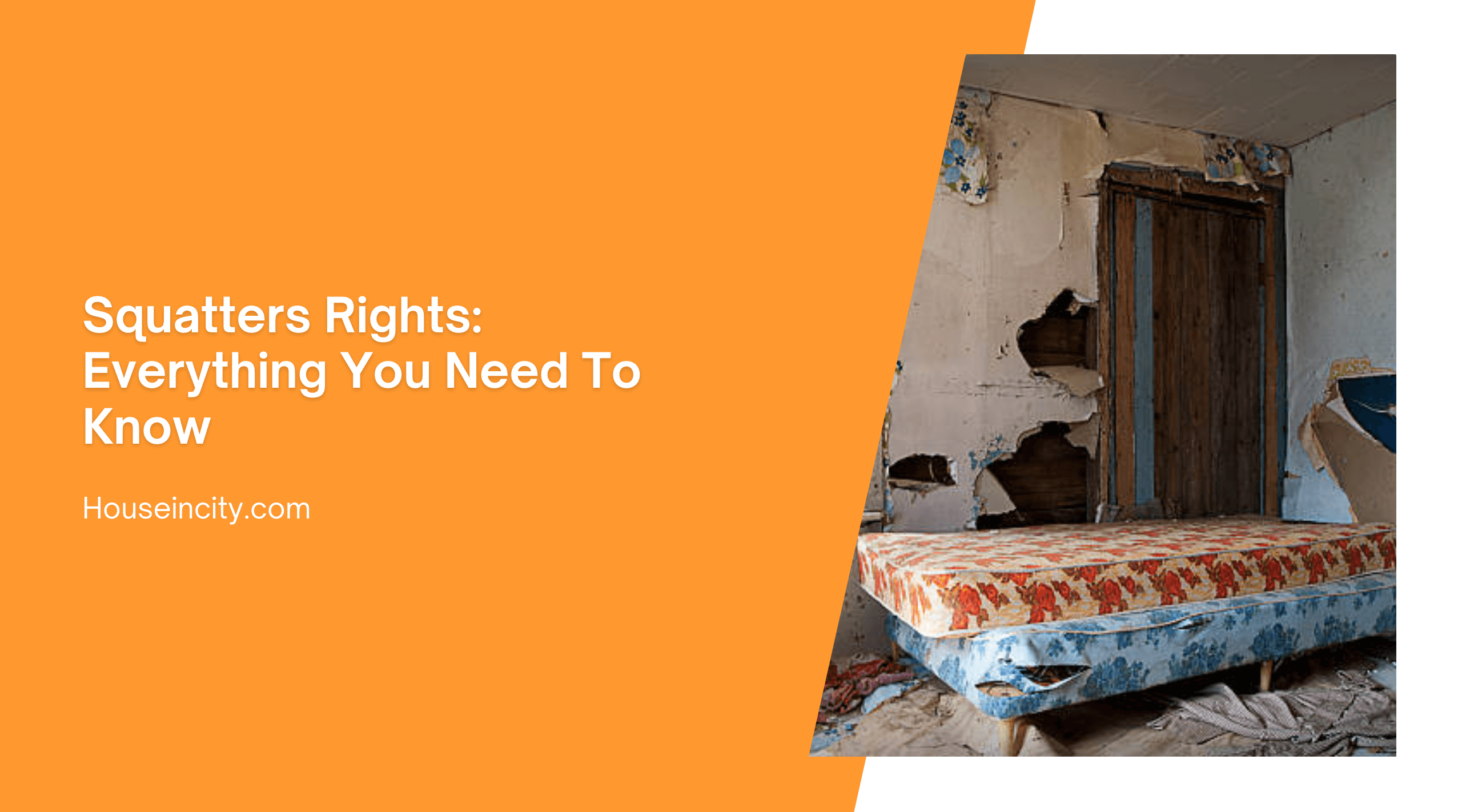If you happen to own a rental property, understanding squatter rights is essential. Squatters are unauthorized tenants that every landlord prefers not to have, and understanding the legal rights designed for them is vital if you’re planning to take action against them.
Typically, the people who live on your property are those who pay you to stay there. However, in some cases, you discover an individual or a group of individuals have moved into your rental property without your knowledge. This can be a nightmare that every landlord dreads!
Here’s why? These residents illegally stay and cause extensive damage to the property, both internally and externally. Besides the damage, squatters don’t pay the rent, which is challenging. Removing these unauthorized tenants can be legally tricky and costly with the adverse possession laws in place.
So, what is a squatter, and do they have any rights? Is it legally possible to remove a person squatting in your rental property? Here we will find out everything you need to know about squatters rights.
Squatter Definition
A squatter is a person or a group of individuals who reside in a rental property without permission or authorization from the property owner. In such cases, the property is mostly uninhabited or abandoned by the property owners. These squatters enter into rental properties and occupy them unlawfully without the landlord’s knowledge.
For sure, these unauthorized tenants can be a wide range of possible parties. For instance, if tenants refuse to leave even after the lease agreement has ended or an Airbnb guest who stays beyond the required time in some situations, they are considered squatting the property. In some cases, these illegal tenants occupy the land intentionally. In other cases, these squatters believe they possess the legal rights to be on the property due to the following:
- An agreement was made with the previous landlord.
- Fraudulent rental agreements or
- Any other legal aspects.
Squatters are not the same as guests or tenants. Tenants are legally authorized individuals who have entered into a legally binding rental contract with the landlord, bound by lease terms, and pay the rent every month to stay on a person’s rental property. Guests are individuals invited by the landlord or legal tenants to stay on the property only for a limited period.
While each of these individuals resides on a rental property they do not own, what makes squatters different is that they occupy the rental property without the landlord’s consent or knowledge in an illegal manner.
Squatters Rights: Explained
Squatters rights are laws that protect those tenants who illegally occupy a rental property or eventually own the property with time. The squatting laws vary from state to state. As a rental property owner, it is essential to find out when these legal rights apply and how you can reclaim and protect your property from future misuse.
Squatting laws by state permit landlords to evict these unauthorized tenants from their unoccupied property. Though it can be legally tricky, in most cases, you will require an eviction notice or follow legal procedures to get them out safely.
Understanding the squatting rights will enable you to use the best approach while removing these unwanted tenants. If squatters have occupied the vacant land without permission for a long timeframe, these residents can claim these rights.
Ultimately, the squatters rights give these unauthorized tenants the privilege to become legal owners of the property over time. It turns out these inhabitants will be granted the property title if they stay on the land without causing any disturbances and pay the local property taxes for a certain number of years.
Do Legal Rights protect Squatters?
Squatters are individuals or groups that move into rental properties without informing or getting permission from the property managers. This might get you thinking, Is squatting legal in the United States? Believe it or not, squatters have legal rights to occupy vacant or rental properties in most jurisdictions.
Adverse possession is the legal term used for squatting. In most US states, adverse possession is the legal code for protecting the rights of squatters from being removed from the property forcefully. In such cases, property owners are required to follow a legal eviction procedure by giving an eviction notice if they want the squatters to leave their property.
Certain state adverse possession laws allow squatters to gain the rights to the ownership title of the property if they reside in it for a certain period of time, provided they pay back taxes and fees related to the property. According to squatter rights, the transfer of property title is measured in years instead of months.
| States | Continuous Possession of property |
| California | 5 years |
| Montana | 5 years |
| Florida | 7 years |
| Utah | 7 years |
| New York | 10 years |
| Washington | 10 years |
| Michigan | 15 years |
| Georgia | 20 years |
| Ohio | 20 years |
| New Jersey | 30 years |
In certain states, a squatter’s time duration to occupy a vacant property is reduced if a deed or document is obtained or if the local property taxes are paid in full.
Is Squatting The Same As Trespassing?
Trespassing property is a criminal offense and happens when someone enters land without permission. Such individuals who trespass temporarily into someone’s property can end up getting arrested.
In some cases, these trespasses reside on the property for a period long enough to become squatters. Though squatting is a civil matter, squatters can get arrested and evicted if they reside on an owner-occupied property without the landlord’s permission. When trespassing becomes squatting, the person or group of individuals can obtain legal rights to claim ownership and make the unoccupied property their legal residence.
As per legal terms, the biggest difference that differentiates squatting from trespassing is that a squatter enters the property using an already broken, unlocked, or open window. On the other hand, the trespasser violates and enters the property by breaking down the door or window.
How To Evict A Squatter?
As a landlord or property manager, you must be wondering how to evict a squatter without creating any adverse legal issues.
Property owners who find individuals squatting on their unoccupied property must hire legal advocates instead of trying to remove the squatters on their own. The reason is that squatting laws for eviction vary from state to state, and most jurisdictions have certain rules for protecting squatter rights.
Each US state has regulations for evicting unauthorized tenants from your vacant property. If you plan on filing an eviction notice against the squatter without a lawyer, you need to be aware of all the adverse possession laws. The general rules for evicting squatters are as follows:
- Find out if the tenants are squatters or trespassers:
Before you take any legal action, property owners must find out how long the occupants have been staying on the property. The reason is that legal regulations for squatters and trespassers are different.
Trespasses who enter a property illegally and stay for a short time are usually involved in stealing or vandalizing and are subject to criminal penalties. In such cases, you can inform the law-enforcement officers and remove the illegal tenants who are occupying your property by breaking into it.
Meanwhile, squatters are individuals who legally move into a property and stay for a long period, intending to eventually acquire the property ownership title with the help of adverse possession laws.
- Start the Eviction process:
If you have squatters on your rental property, in most cases, the squatter eviction process is similar to the usual residential eviction process. For the formal eviction process, you will have to follow the below steps:
- Check out the local eviction regulations or hire a legal attorney to assist with squatters eviction.
- Provide the squatters with an eviction notice.
- If they do not leave, file a complaint in the local court of law.
- Collect all the necessary documents to prepare for the lawsuit.
- If the ruling is in your favor, the squatter will have to leave your property.
- Look out for adverse possession laws:
Adverse possession takes place when a squatter has moved into your property hostilely for an extended period without your knowledge or permission. This is why you must not wait too long to begin the squatter eviction procedure. As per the adverse possession laws, failure to file the eviction notice quickly will place the ownership of the property in the squatter’s hands.
Final Thoughts
The best way to protect your unoccupied property from squatters is to maintain it in good condition and visit the place regularly. In addition to monitoring your rental property, it is advisable to look out for quality tenants to rent out the space and maintain a good relationship with them throughout their lease agreement period.
In this manner, you will be able to avoid unauthorized and illegal individuals or groups of individuals from breaking in and entering your property without your knowledge and permission. In case you have squatters residing on your property, you need to be aware of the squatters rights if you’re planning to evict them on your own. Or else, make sure to hire a lawyer to evict the squatters to avoid any legal issues that may arise.

